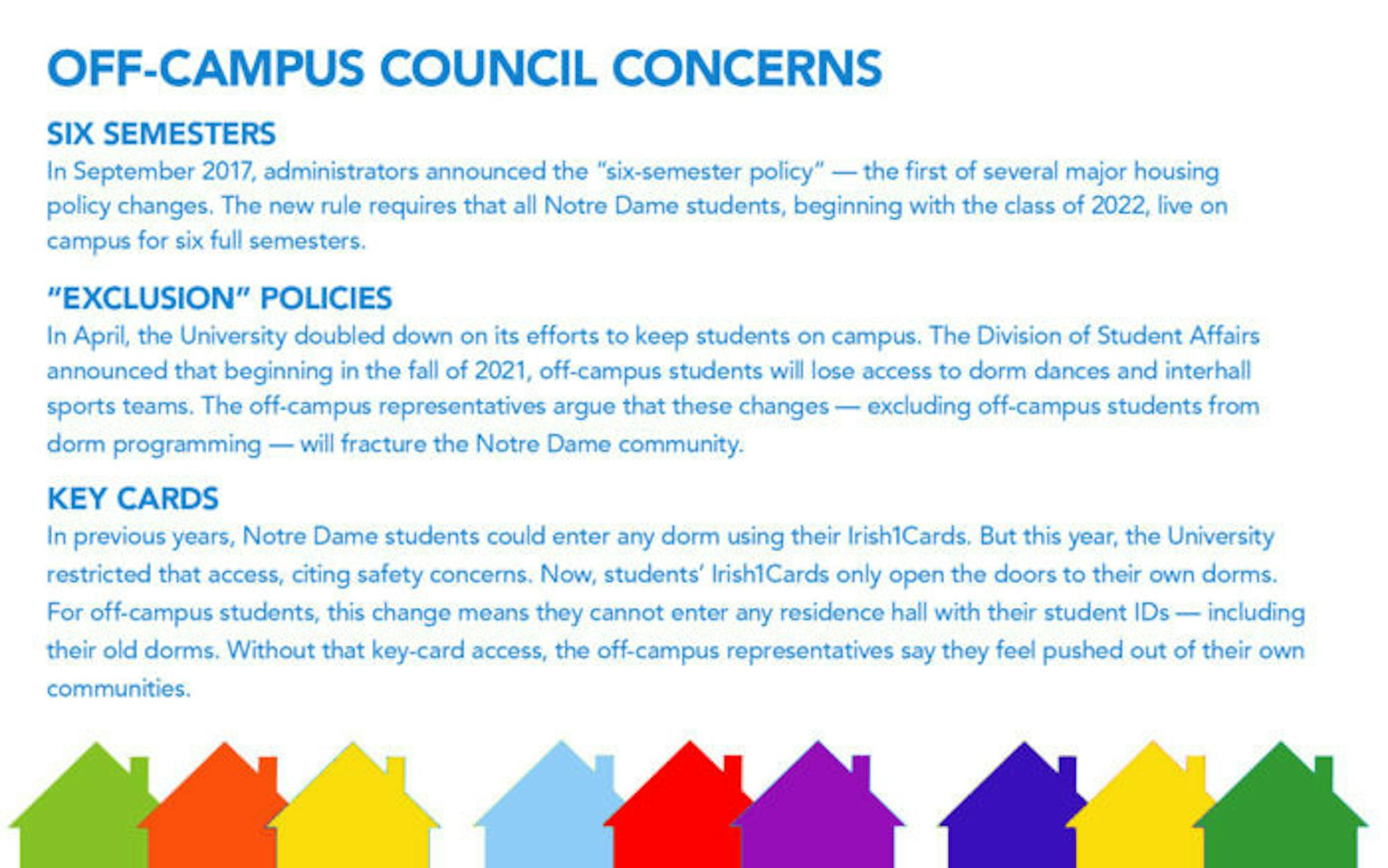In recent years, the Notre Dame administration has made several changes to its housing policies to discourage students from moving off campus. Administrators say the policies will strengthen the campus community, but off-campus student leaders argue that the policies will push students further apart.
“It’s a family and a sense of belonging that I think they’re trying to take away from us,” senior Katie O’Sullivan, president of the Off-Campus Council, said.
Six semesters
In September 2017, administrators announced the “six-semester policy” — the first of several major housing policy changes. The new rule requires that all Notre Dame students, beginning with the class of 2022, live on campus for six full semesters.
Quentin Colo, the student senator for the off-campus community, said low-income students feel squeezed by the six-semester requirement.
“Several students reached out to me and they said, ‘Look, I have to move off campus. I don’t want to pay $16,000 to live in the dorm. Why would I do that when I can pay $5,000, [and] get a cheaper meal plan off campus?” Colo, a senior, said.
Additionally, off-campus leaders say the six-semester policy poses problems for transfer students, who aren’t guaranteed a spot in the residence halls.
“They’re overpopulating the campus but also shutting away transfers,” Susan Seiler, vice president of the Off-Campus Council, said.
With fewer housing options, O’Sullivan said many students’ needs will go unmet.
“There are a variety of reasons why people move off [campus], and taking that away from people — it’s not right,” O’Sullivan said.
Off-Campus “exclusion” policies
In April, the University doubled down on its efforts to keep students on campus. The Division of Student Affairs announced that beginning in the fall of 2021, off-campus students will lose access to dorm dances and interhall sports teams.
The off-campus representatives argue that these changes — excluding off-campus students from dorm programming — will fracture the Notre Dame community.
“In my dorm, the people who are off campus who are still involved in the community — they’re looked up to. They’re pillars of the community,” Colo said.
Without those off-campus students present at dorm events, the representatives say that everyone — on-campus and off-campus students alike — will suffer.
“It’s hurting underclassmen who now no longer have people to look up to and talk to and ask about classes because they’ll never be at dorm events anymore,” Seiler said.
Colo says the University isn’t acting in students’ best interests.
“Most of the University’s policies, it’s kind of like a wolf in sheep’s clothing. But the three-year policy and the recent exclusion policy are coming as wolves. There’s no way to look around it. The only motive that I see is perhaps a profit one,” Colo said.
Key cards
In previous years, Notre Dame students could enter any dorm using their Irish1Cards. But this year, the University restricted that access, citing safety concerns. Now, students’ Irish1Cards only open the doors to their own dorms.
For off-campus students, this change means they cannot enter any residence hall with their student IDs — including their old dorms. Without that key-card access, the off-campus representatives say they feel pushed out of their own communities.
“It’s like taking away the keys to your house,” O’Sullivan said, “I think they downplayed the severity of that, but it’s a big thing. It’s just one more step in the … process of kicking off-campus students out of the Notre Dame community.”
Colo says he’s skeptical of the University’s reasoning behind the new Irish1Card policy.
“I do think the University has some concern about safety, and I understand that. We all want to live in a safe dorm,” Colo said. “But I just don’t think that the most recent policies are [motivated by] safety. I just truly don’t believe that.”
Value of the Off-Campus Experience
If the University had its way, and no students ever moved off campus, the Notre Dame community would lose important perspectives, the leaders said. Seiler explained that the dorms don’t prepare students for life after college.
“We actually need life skills. There’s not a class here that teaches you how to cook for yourself, how to grocery shop, how to budget. You don’t have to learn any of that living in a dorm,” Seiler said.
The off-campus leaders added that many students sleep, eat and shop on campus, and rarely venture into South Bend.
“Some kids just literally don’t know there’s a world outside of Notre Dame,” Seiler said.
This divide between the Notre Dame and South Bend community is a problem, the representatives said. They worry that if fewer students move off campus, that divide could deepen.
“Being off campus has definitely attuned me to the problems of people who are living in South Bend,” Colo said.
Hearing but not listening
The off-campus representatives say the University has been ignoring their concerns.
“We have not met with them about any of these changes. And I really question how much they actually listen to what we’re saying,” Colo said.
O’Sullivan said she’s reached out to administrators and tried to discuss the housing policy changes, but administrators have not yet agreed to meet.
“I felt like we were just being pushed to the side,” O’Sullivan said.
In the meantime, the representatives are trying to organize the off-campus student community. On October 1, they’re hosting an Engagement and Informative Housing Fair for students who already live off-campus or those who are considering moving off. They’re also developing a petition opposing many of the new housing policies.
But, as the University moves forward with its housing initiatives, the off-campus students worry that administrators won’t consider their perspectives.
“They always say they hear us,” Colo said, “I wish they actually listened to us.”
Read More
Trending









